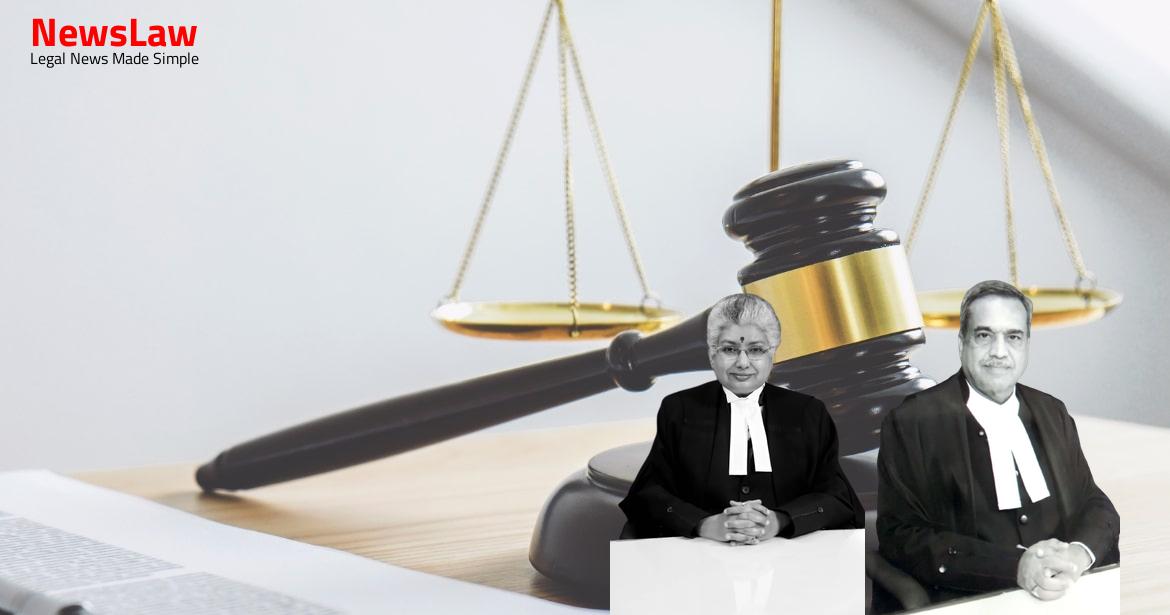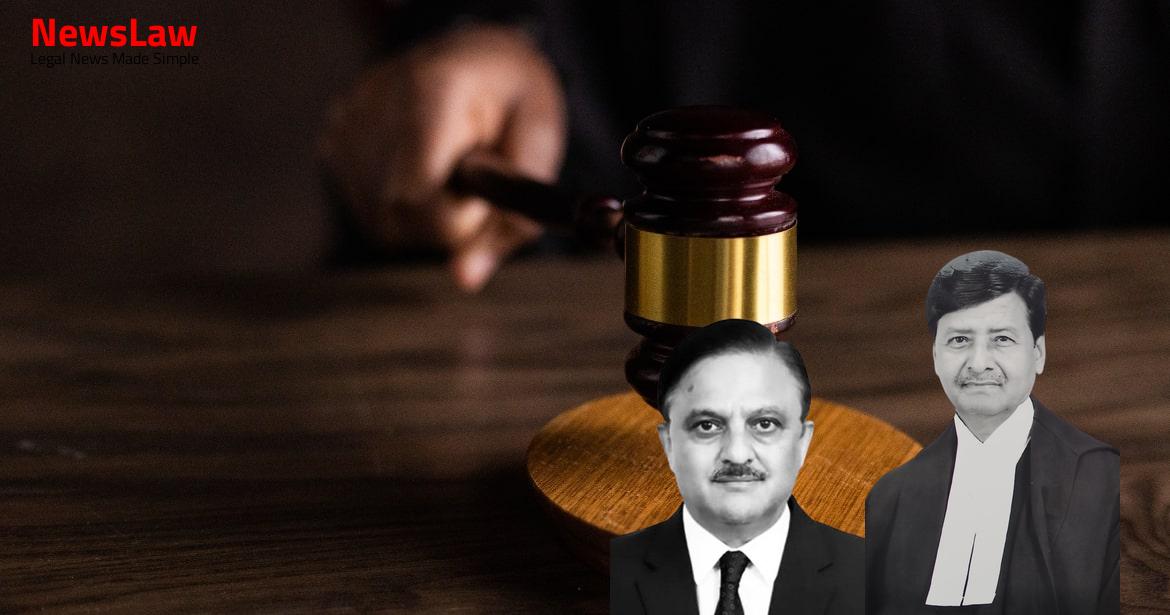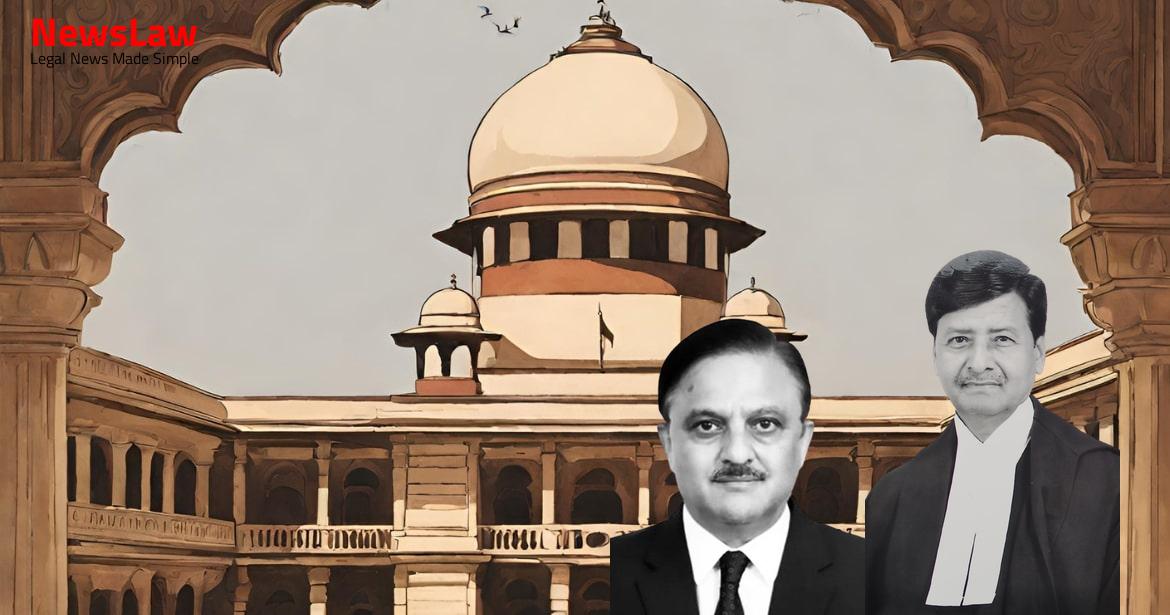Unravel the complexities of legal analysis in a recent court decision regarding the grant of bail. Discover the meticulous examination of legal principles that influenced the final decision. The case highlights the importance of thoughtful consideration and application of established legal norms in the justice system.
Facts
- The High Court directed to release Respondent No.2 on bail based on the grounds of the case arising from a commercial transaction and the documents already seized.
- The original complainant is aggrieved and dissatisfied with the High Court’s decision to release the accused on bail.
- The impugned judgment and order were passed in connection with FIR No.128 of 2019 PS Economic Offences Wing in New Delhi for various offences under IPC sections 409, 420, 467, 468, 471, and 120B.
- Accused – Respondent No.2 is the Managing Director of M/s Aranath Logistics Limited engaged in multi-commodity trading business.
- A settlement agreement was reached between the appellant and Respondent No.2 during the course of the Special Leave Petition.
- Charge-sheet has been filed against Respondent No.2 and other co-accused.
- Multiple bail applications were filed by Respondent No.2 before different courts, one of which was dismissed by the Sessions Judge.
- Allegations include siphoning off large sums of money to shell companies and fraudulent activities involving transfers of funds.
- Prima facie case found against Respondent No.2 and others leading to the registration of FIR No.128.
- The accused misused funds meant for specific purposes, leading to financial irregularities.
- Investigations revealed the redirection of funds to various shell companies and individuals connected to the accused.
- Allegations of misrepresentation by the accused regarding financial health of the company during loan acquisition.
- Court declined withdrawal of the Special Leave Petition due to the severity of allegations against Respondent No.2.
Also Read: Ruling on Circumstantial Evidence in Murder Case
Arguments
- Shri Mukul Rohatgi, Senior Advocate for Respondent No.2 argued against cancellation of bail granted by the High Court.
- He emphasized that the dispute is civil in nature, arising from commercial transactions.
- The investigation is concluded, supported by documentary evidence seized during the process.
- Respondent No.2 cooperated during the investigation and hasn’t misused liberty after being released on bail.
- The transfer of Rs. 15 crores to a sister concern, LNJ International Limited, to pay off a loan is not considered an offence.
- Shri Rohatgi, representing Respondent No.2, heavily relied on various court decisions to support his argument against cancelling bail.
- The cited cases include Dolat Ram vs State of Haryana (1995) 1 SCC 349, X vs State of Telangana (2018) 16 SCC 511, and Prabhakar Tewari vs State of U.P. (2020) 11 SCC 648.
- The decision in Gurcharan Singh vs State (Delhi Administration) (1978) 1 SCC 118 was also referenced.
- The argument emphasizes that bail should not be cancelled unless the accused violates terms, misuses liberty granted, or under specific circumstances.
Also Read: Challenging Legal Presumptions in Negotiable Instrument Cases
Analysis
- The High Court granting bail did not consider relevant factors and principles such as the nature and gravity of the accusation, modus operandi, and evidence collected during the investigation.
- The accused is alleged to have committed a serious crime of killing an old lady and siphoning off a huge sum through shell companies.
- The High Court mechanically granted bail based on the commercial transaction nature of the case and seized documents.
- The accused’s method of committing the offense and using shell companies was not given due regard by the High Court.
- The status report highlighted systematic fraud and misuse of shell entities by the accused, which the High Court ignored in granting bail.
- The High Court’s failure to consider all relevant factors makes the bail order unsustainable and not judiciously exercised.
- The High Court’s bail order did not weigh the evidence correctly and overlooked crucial aspects of the case.
- The relevant considerations while granting bail are the nature of seriousness of the offence, character of the evidence peculiar to the accused, likelihood of fleeing from justice, impact on prosecution witnesses and society, and likelihood of tampering.
- An elaborate examination of evidence and detailed reasoning should be avoided while granting bail, especially in cases of a second nature.
- The jurisdiction to grant bail must be exercised based on well-settled principles and not in an arbitrary manner.
- If the High Court fails to consider relevant factors and mechanically grants bail, the order would be illegal due to non-application of mind.
- While dealing with an application for grant of bail, certain factors such as nature of accusation, supporting evidence, tampering with witnesses, and prima facie satisfaction of the Court in support of the charge must be taken into consideration.
- Cancellation of bail due to misconduct of the accused or supervening circumstances is different from setting aside a bail order that is unjustified, illegal, or perverse.
- The High Court did not find it worthwhile to reference the rejection of three bail applications by the Additional Chief Judicial Magistrate, which is a crucial oversight.
- In an appeal against the High Court’s order, a two-Judge bench of the Court analyzed the precedent on the principles guiding the grant of bail.
- Observations made in the present order shall not affect the trial and be confined to the bail grant judgment
- Respondent No.2 can apply for bail before the High Court after surrender, after a period of three months
- The High Court will consider the bail application on its own merits, in accordance with the law
- Relevant material collected during the investigation will be taken into consideration for the bail decision
- Factors for grant of bail will be considered during the application process
Also Read: Legal Analysis Critique in High Court’s Quashing Order
Decision
- Explanation of the relevant legal principles
- Application of the legal principles to the facts of the case
- Decision reached by the court based on the legal analysis
Case Title: CENTRUM FINANCIAL SERVICES LIMITED Vs. STATE OF NCT OF DELHI (2022 INSC 115)
Case Number: Crl.A. No.-000094-000094 / 2022



